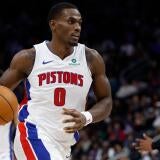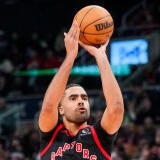
Where the Rockets go without Patrick Beverley
Houston point guard out for the season with wrist injury. How can Houston maintain its title hopes without its bulldog point guard?

The Houston Rockets announced Monday that point guard Patrick Beverley has elected for surgery on the torn ligament in his left wrist and will miss the remainder of the season. As I try and remember every time there's a major injury, this means Beverley is in pain and will be going through more as he recovers from surgery. Remember the human side even as we discuss the basketball implications.
Obviously, losing your starting point guard is never a good thing, but the Rockets are actually well-equipped to get past this kind of loss.
WHAT'S GONE
Obviously, the biggest loss for the Rockets with Beverley out is on the defensive end. According to Synergy Sports, Beverley is in the 85th percentile among all players in on-ball defense. In isolation situations, opponents shoot just 27 percent when Beverley is defending.
This varies when you look to the NBA's SportVU data, which says that opponents shoot 0.5 percentage points better with him defending, making it effectively a wash. But on eye test alone, he's a dogged on-ball defender, capable of harassing opponents into losing their cool and turning the ball over. His penchant for what some consider "reckless" play is well documented, but his energy and effort still translate to very real results.
There are also mitigating factors, there, however. James Harden is clearly the lifeblood of the Rockets. And with Harden on the floor and Beverley off this season, the Rockets are seven points better per 100 possessions than when Beverley's off, and five points per 100 possessions better defensively. Just to restate that in English: the Rockets are better defensively with Harden on the floor and Beverley on the bench than with both of them on the court.
One very key aspect that I noted was that the Rockets give up the same frequency of three-point attempts with Beverley on vs. off. Containing 3-point attempts, not just percentage, but just the raw number thrown up, is a big part of modern defense, and the Rockets aren't affected much by that.
Offensively, his impact is limited. He shoots 38 percent from the floor, but 36 percent from 3-point range which is where the Rockets want him. In particular, he shoots 38 percent on catch-and-shoot shots via NBA.com. This is the fourth best mark on the Rockets, but his replacement helps out a lot with covering for this.
In short, the Rockets are losing a great on-ball defender they could use for certain matchups (think a 3-6 matchup with the Clippers' Chris Paul or a 4-5 with Tony Parker), but whose overall impact on the team has been negligible from a metrics standpoint. And more importantly, they're well-equipped to cover for him.
THE REPLACEMENTS
Jason Terry was left for dead. After a disappointing turn in Boston, he barely played in Brooklyn, then was traded to the Kings in a salary dump and never played a moment. But he's been resurgent in Houston, shooting 39 percent from 3-point range, and averaging two assists per game.
The Rockets are three points better per 100 possessions with Terry on the floor defensively, and about the same in overall net efficiency. He can do everything the Rockets need from their other guard: bring the ball up the floor, play defense, make smart plays to victimize defensive mistakes, and knock down open threes. He shoots 40 percent on catch-and-shoot threes this season.
Pablo Prigioni, on the other hand, shoots 20 percent on catch-and-shoot shots, and the Rockets are 7.2 points per 100 possessions worse with Prigioni on the floor. That's a concern.
The big picture here, though, has nothing to do with a point guard at all.
NO POINT GUARD NEEDED
The reality is that James Harden acts as point guard, in so far as bringing the ball up and acting as decision maker offensively. The offense begins and ends with Harden. The lineup you're likely to see a lot of in the playoffs (but not starting), JET-Harden-Corey Brewer-Josh Smith-Dwight Howard has only played 13 minutes together this season.
The Rockets can use Harden as point in bigger lineups with Brewer at the 2-guard, Ariza at the three, Smith or Motiejunas at four, and Howard at five. They can go smaller with Motiejunas at the five, and unleash Harden in the full court. The Rockets are designed for Harden to carry them.
In the meantime defensively, Trevor Ariza can take the bulk of the tougher assignments. The problem will be with dynamic point guards, but since most of those sets will involve pick and roll action, the Rockets can switch and try and cover with Howard back to defend the rim.
To sum up: The Rockets can survive the Beverley injury. It's awful, for Beverley and the team, but they are also specifically designed to withstand that kind of problem.
They sure could use Isaiah Canaan who they traded for K.J. McDaniels who isn't playing right now, though.

















